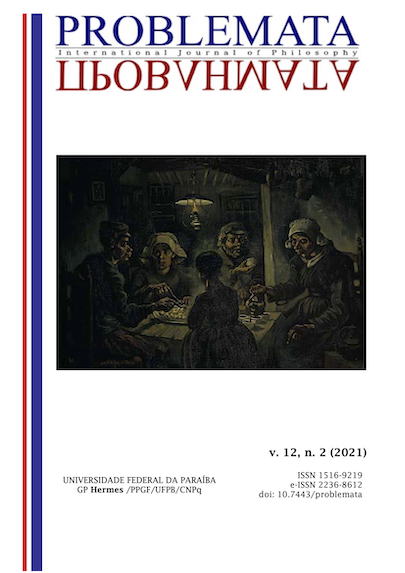RICHARD RORTY READER OF RAWLS:
A THEORY OF JUSTICE FROM A POSTMODERN PERSPECTIVE
DOI:
https://doi.org/10.7443/problemata.v12i2.59376Keywords:
justice, postmodernity, John Rawls, Richard RortyAbstract
Philosophical heir of Kantian contractualism, analytical philosopher and committed to the traditional task of providing fundamentals, advice and even a system that puts us in the safe direction about the deliberations on the concept of justice, John Rawls is a philosopher who fits in with molds of the traditional philosophy, produced in the academic world. Even though, like Rawls, Richard Rorty has built a career in renowned traditional universities, he opted for a somewhat iconoclastic bias, not only criticizing all Western metaphysics, but modernity itself. Would it be possible to reconcile both thoughts and read Rawls' masterpiece - A theory of justice - from a postmodern perspective? This article aims to investigate this possibility.
Downloads
References
LYOTARD, Jean-François. A condição pós-moderna. 15. ed. Tradução de Ricardo Corrêa Barbosa. Rio de Janeiro: José Olympio, 2013.
RAWLS, John. Justiça como equidade: uma reformulação. Tradução de Cláudia Berliner. São Paulo: Martins Fontes, 2003.
RAWLS, John. Uma teoria da Justiça. 4. ed. Tradução de Jussara Simões. São Paulo: Martins Fontes, 2016.
RORTY, Richard. Objetivismo, relativismo e verdade: Escritos filosóficos I. Tradução de Marco Antônio Casanova. Rio de Janeiro: Relume Dumará, 2002.
RORTY, Richard. Contingência, ironia e solidariedade. Tradução de Vera Ribeiro. São Paulo: Martins Fontes, 2007.
STANLEY, Jason. Como funciona o fascismo: a política do “nós” e “eles”. 2. ed. Tradução de Bruno Alexander. Porto Alegre: L&PM, 2019.
Downloads
Published
Issue
Section
License
Copyright (c) 2021 Daniel Luis Cidade Gonçalves

This work is licensed under a Creative Commons Attribution 4.0 International License.
Authors who publish with this journal agree to the following terms:
- Authors retain copyright and grant the journal right of first publication with the work simultaneously licensed under a Creative Commons Attribution License that allows others to share the work with an acknowledgement of the work's authorship and initial publication in this journal.
- Authors are able to enter into separate, additional contractual arrangements for the non-exclusive distribution of the journal's published version of the work (e.g., post it to an institutional repository or publish it in a book), with an acknowledgement of its initial publication in this journal.
-
- Authors are permitted and encouraged to post their work online (e.g., in institutional repositories or on their website) prior to and during the submission process, as it can lead to productive exchanges, as well as earlier and greater citation of published work (See The Effect of Open Access).





